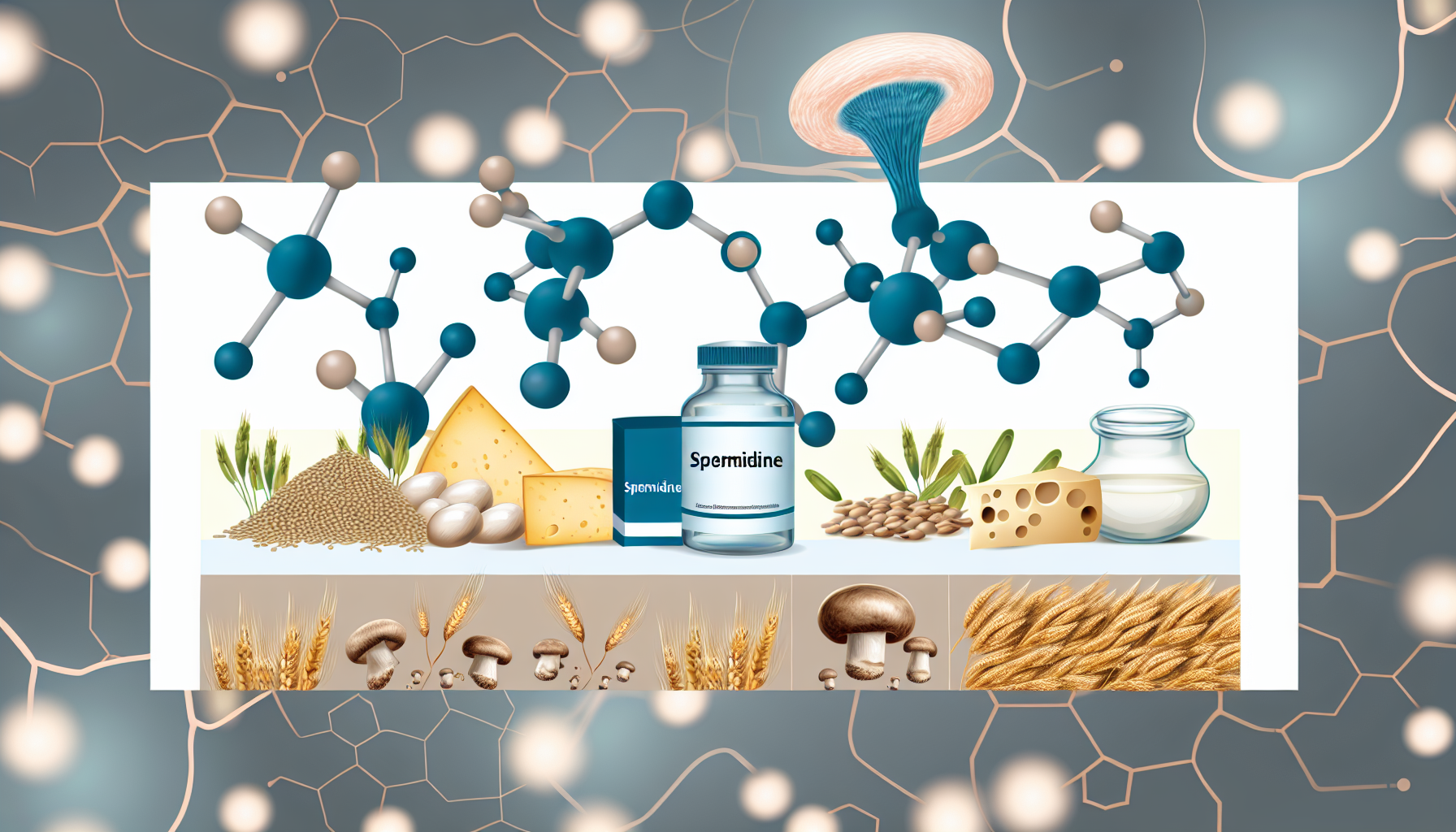Spermidine for Longevity: Evidence-Based Guide
Comprehensive analysis of spermidine supplementation for anti-aging through autophagy activation, cardiovascular protection, and lifespan extension. Food sources, optimal dosing, and human evidence.

What is Spermidine?
Spermidine is a naturally occurring polyamine compound found in all living cells. Originally discovered in semen (hence the name), spermidine is present throughout the body and in many foods, with particularly high concentrations in wheat germ, soybeans, aged cheese, and mushrooms.
What makes spermidine special for longevity: It's one of the few compounds with both animal lifespan extension data AND positive human observational evidence. Spermidine robustly induces autophagy - the cellular "housekeeping" process that removes damaged proteins and organelles, declining dramatically with age.
Why Spermidine for Longevity:
- Autophagy Activation: Primary anti-aging mechanism - clears cellular "junk" that accumulates with age
- Human Evidence: High dietary intake associated with 5.7 year lifespan increase and 40% reduced cardiovascular mortality
- Multi-Species Extension: +10% lifespan in mice, +30% in flies, +15% in worms - rare consistency
- Food-Based: Achievable through diet (wheat germ, aged cheese, mushrooms, legumes)
Evidence-Based Health Benefits
Induces autophagy - cellular self-cleaning process that removes damaged proteins and organelles
Evidence: Animal and human studies show spermidine robustly activates autophagy, a key longevity mechanism declining with age
Reduces cardiovascular mortality and improves heart function in multiple studies
Evidence: Human observational study: High spermidine intake associated with 40% reduction in cardiovascular mortality and 5.7 year increase in lifespan
Protects against neurodegeneration and age-related cognitive decline
Evidence: Animal models show protection against Alzheimer's pathology and improved memory via autophagy activation
Extends lifespan across multiple species from yeast to mice
Evidence: Mice: +10% median lifespan. Flies: +30% lifespan. Worms: +15% lifespan. Consistent across species
The Bruneck Study (829 participants, 20-year follow-up) found that high dietary spermidine intake was associated with:
- • 40% reduction in cardiovascular mortality
- • 5.7 year increase in lifespan for high vs low consumers
- • Dose-dependent relationship: More spermidine = greater benefits
- • Median intake in high consumers: ~12 mg/day (achievable through diet)
This is observational data (not RCT), but the magnitude of effect and mechanistic plausibility make it compelling.
Rich Dietary Sources of Spermidine
Dietary intake is preferred over supplementation when possible. Spermidine in whole foods comes with synergistic compounds and better bioavailability.
Practical Dietary Strategy to Reach 5-10 mg Daily:
- • 2 tablespoons wheat germ (~6 mg) - add to yogurt, oatmeal, smoothies
- • 1 cup cooked mushrooms (~4-5 mg) - shiitake, maitake, or white button
- • 1 oz aged cheddar cheese (~2-4 mg) - the longer aged, the higher spermidine
- • 1/2 cup green peas (~2.3 mg) - fresh or frozen
- • 1 cup broccoli (~1.3 mg) - excellent for overall health too
Result: Combining 2-3 of these daily easily achieves 5-12 mg spermidine - the range associated with longevity benefits in human studies.
Evidence-Based Dosing Protocols
Evidence: Observational studies show benefits at dietary intake levels (median 12 mg/day in high consumers)
Suitable For: General health, sustainable long-term approach
Achievable with wheat germ, aged cheese, mushrooms, legumes. Most natural and cost-effective approach
Evidence: Based on human trials showing cardiovascular and cognitive benefits at low doses
Suitable For: Those unable to consume spermidine-rich foods regularly
Wheat germ extract supplements typically provide 1-5 mg per serving
Evidence: Some studies use higher doses for more robust autophagy activation
Suitable For: Aggressive longevity protocols targeting autophagy
Higher than observational study levels but used in some interventional trials
Excellent safety: Spermidine is naturally present in all cells and consumed daily in food. Human trials using 1-10 mg supplemental spermidine show no adverse effects.
Endogenous production: Body produces spermidine naturally. Gut bacteria also synthesize it. Supplementation increases existing levels rather than introducing foreign compound.
Decades of dietary exposure: Foods like wheat germ and aged cheese consumed safely for centuries provide long-term safety data.
Bottom Line: Promising Autophagy Inducer
Spermidine is one of the most promising longevity compounds with rare combination of animal lifespan extension, human observational data, clear mechanism (autophagy), and excellent safety profile. The ability to achieve therapeutic doses through food makes it accessible and sustainable.
- ✓Dietary approach preferred: 2 tbsp wheat germ + mushrooms + aged cheese + green peas = 5-12 mg daily
- ✓Supplement if needed: Wheat germ extract 1-5 mg daily. Higher doses (5-10 mg) for aggressive protocols
- ✓Best for: Autophagy activation, cardiovascular health, comprehensive longevity protocols
- ✓Synergistic with: Exercise, fasting (both induce autophagy), resveratrol, berberine
Building a Complete Longevity Protocol?
Spermidine's autophagy activation complements other longevity pathways. Combine with omega-3s for cardiovascular synergy, EGCG for HMGB1 inhibition, and berberine for AMPK activation.
View All Longevity Supplements →Key Research References
- • Bruneck Study (829 participants, 20-year): High spermidine intake associated with 5.7 year lifespan increase and 40% reduced cardiovascular mortality
- • Animal lifespan extension: +10% in mice, +30% in flies, +15% in worms - consistent across species
- • Mechanism: Robust autophagy induction - cellular cleanup process critical for longevity that declines with age
- • Food sources: Wheat germ (24 mg/100g), soybeans (21 mg/100g), aged cheese (10-20 mg/100g), mushrooms (9 mg/100g)
- • Dosing: 5-10 mg daily achievable through diet. Median intake in high consumers: ~12 mg/day
- • Safety: Excellent - naturally present in all cells, consumed daily in food, no adverse effects in human trials